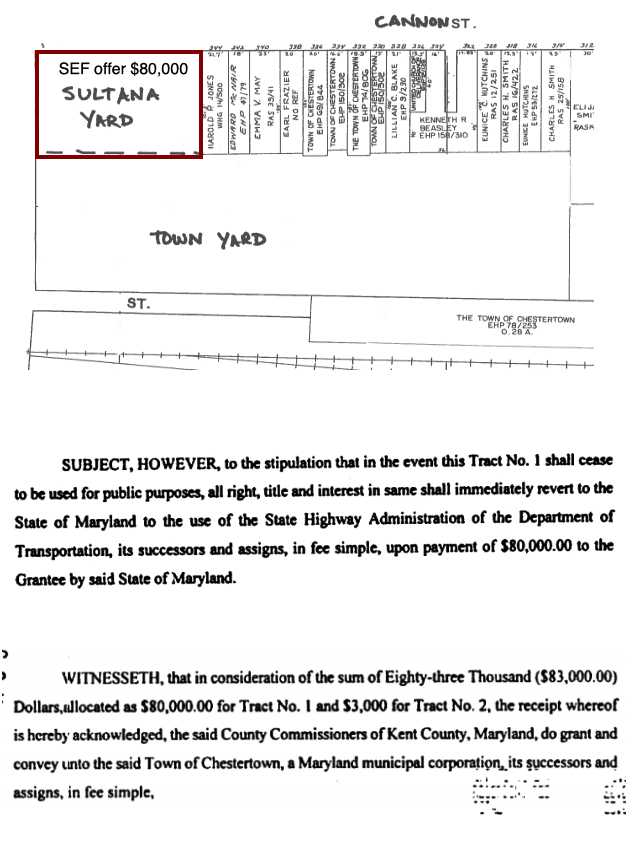Sultana Education Foundation President Drew McMullen made public Monday the nonprofit’s offer to buy the shipyard it has leased at Cannon and Mill Streets since 1997–but he acknowledged there were hurdles to clear before taking ownership.
McMullen said he was going into the negotiations with his “eyes wide open,” acknowledging that the Town could make other plans for the publicly owned lot.
“If there’s a way for the town to go out and make hay with this property, over and above what we can do with it, you should do it,” he said at Monday’s council meeting. “We are not saying we have any right to this property whatsoever. We just have a need for it, I’m not sure anyone else does.”
“We’re here to say that if you’re interested in selling it, we’re interested in buying, you don’t owe it to us [and] everything is up for negotiation,” he said.
McMullen said the use of the shipyard has changed since the Sultana was launched in 2001 to more of a maintenance facility and to serve as a staging and storage area for their paddle programs. He said 40 to 50 canoes and kayaks are stored there.
 “We actually serve as many students in our canoe and kayak programs now as we do on the [Sultana],” he said. “It’s a very helpful place to store and work on that gear.”
“We actually serve as many students in our canoe and kayak programs now as we do on the [Sultana],” he said. “It’s a very helpful place to store and work on that gear.”
He said the location of the shipyard was also ideal for its proximity to the Holt Center on Cross Street, which serves as SEF headquarters and main teaching facility.
“It’s very convenient for us in our self-interest to have it close to what we’re doing,” he said.
McMullen said potential donors would shy away from funding improvements without ownership or a long-term lease.
Another wrinkle in any sale of the property is the existence of contamination from when it served as a facility for the Maryland State Highway Administration.
McMullen said digging down two feet to the water table results in water the “color of the rainbow,” meaning the presence of fuel contamination. He believes that an environmental study would be required if the lot was used for “anything more than making it a parking lot.”
Town Manager Bill Ingersoll said the site came with monitoring wells from oil “mishaps in the past.”
The Town paid $80,000 for Tract No. 1 as part of a 1.71-acre purchase from the Kent County Commissioners in 1997. Tract No. 2 was sold for $3,000. Sultana is on Parcel 3 of Tract 1 and SEF has offered to buy it for $80,000.
Correction: When this story first ran the Spy indicated that the Sultana Shipyard was all of Tract 1. This was incorrect as pointed out by McMullen in an email on Jan. 8. The Spy did not correctly identify the shipyard as Parcel 3 of Tract 1. The Spy regrets the error. McMullen also indicated that Tract 2 is no longer owned by the Town.
“As I understand it from our advisors the $80,000 paid was for Tract 1, which consists of all three parcels owned by the Town. The shipyard is on Parcel 3 of Tract One. Tract 2 is on the other side of Mill Street, a strip 30′ x 109′, which I believe the Town no longer owns. The property has a complicated history which has also been confusing for us to document/decipher,” McMullen wrote.
The Spy will followup on what happened to Tract No. 2
Eight years earlier the County purchased Tract 1 and 2 from the Maryland State Highway Administration.
The chain of custody maintained a deed restriction, a reverter clause that gave the state the right to recover Tract No. 1 for the sum of $80,000–should it “cease to be used for public purposes.”
The Council passed a motion at Monday’s meeting to seek guidance from the state on the reverter clause and whether Sultana’s current occupancy falls within the guidelines of public use. And, if the reverter clause is nullified by agreement, could the town simply reimburse the state $80,000 and proceed with an RFP to sell the lot at current Market value?
McMullen said SEF offered $80,000 because any excess would ultimately go to the state, based on the opinion of SEF’s attorney.
The offer was made in October but Town Manager Bill Ingersoll made the decision to table the offer until after the fall election.
Ingersoll told the Spy last week that the property would have to be declared surplus by the ordinance to enter into a sale with any buyer.
“…the sale of any property by the Town cannot start until the property is declared surplus or excess by Ordinance.” He recommended Monday that the council withhold any vote on an ordinance until the Town received guidance from the state on how to move forward.
While many residents believe that the property is a presumptive “good fit” for Sultana, other residents have asked why the shipyard would be sold at 1997 prices when the Town is facing tight budgets that have threatened cancellation of recycling and shuttering the Chestertown Police Department.
Several audience members called for a transparent process and questioned why the offer had been kept private for two months.
Don’t miss the latest! You can subscribe to The Chestertown Spy‘s free Daily Intelligence Report here



PAULA B REEDER says
Part of the reason Chestertown is struggling financially are the number of tax exempt properties in Chestertown and the Town’s practice of selling surplus properties at below market prices. Given the Mayors hand- in -glove relationship with Sultana Foundation, a private sale of the property to Sultana at the same price the Town paid for it years ago, at best, raises the question of inappropriate self-dealing.
The most ethical, fiscally responsible, and publicly transparent action for the Town to take once the property is declared surplus would be to open a public bidding opportunity on the property to all interested parties and sell it to the highest qualified bidder. Before doing so, the Town should take responsibility for conducting an environmental inspection of the property and, as may be deemed advisable, promptly undertake remediation of confirmed environmental issues.
Paula Reeder says
Following up on my previous comment, it should be noted that Sultana has “leased” the Cannon Street property from the Town for $1 /yr for the last 20+ years. In that time-frame, Sultana’s donors have not shied away from supporting the organization or improvements to the property. That being the case, Drew ‘s comment that donors would shy away from supporting improvements to the property absent Sultana owning it or entering into a long term lease just doesn’t hold water. In lieu of selling the property, the Town’s interests might be better served by entering into a long term lease with Sultana at an appropriate market rental rate – which could easily be determined on the basis of gross annual rental income for comparable in-town commercial properties. That arrangement could generate several tens of thousands in annual income that might just enable the Town to continue providing existing recycling or other services to taxpaying residents without raising their property taxes.